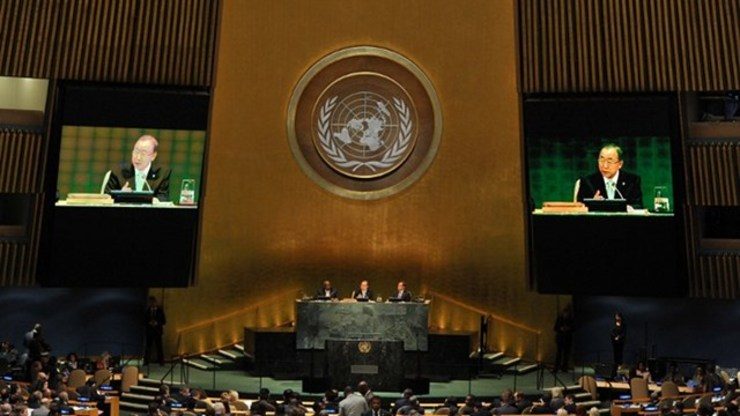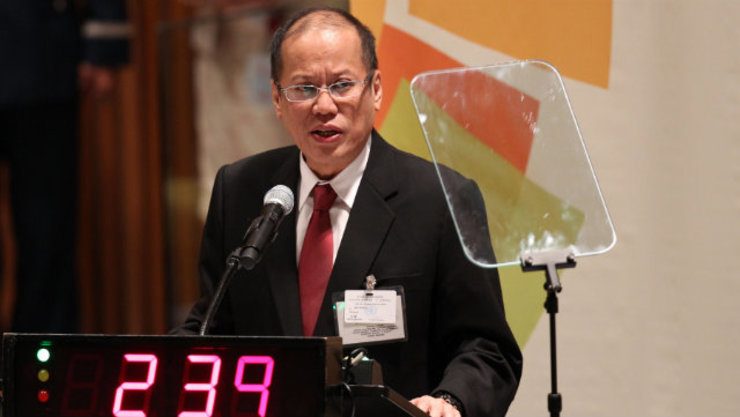SUMMARY
This is AI generated summarization, which may have errors. For context, always refer to the full article.

MANILA, Philippines – Philippine environmental non-government organizations (NGOs) said the United Nations’ summit on climate change – the “biggest climate gathering in history” held on September 23 – “showed positive signs of change” but was not ambitious enough in changing the world’s path on climate change.
The climate summit was the biggest gathering of world leaders for climate action since the failed 2009 climate talks in Copenhagen. It was hosted by UN Secretary-General Ban Ki-moon who challenged world leaders to “set the world on a new course” to respond to the “defining issue of our age.”
The informal summit could have set the tone for the upcoming climate change negotiations in Lima, Peru this December 2014 but the outcome was far from hopeful, said Denise Fontanilla, advocacy officer of Aksyon Klima Pilipinas.
Fighting chance
The summit was an avenue for leaders of the richest countries that have the most greenhouse gas emissions – to make commitments of adaptation funds, emission cuts, and renewable energy investments.
“We waited for signs that the Philippines, and other countries which are hit the hardest by climate change despite doing little to cause it, will be given a fighting chance at survival,” Fontanilla said.
“We saw some positive signs; but, all in all, the pledges were not ambitious enough to keep up with the demand of climate scientists and advocates alike,” Fontanilla said.
Political will needed

Aksyon Klima expressed its disappointment that even the Philippines – a country at the forefront of extreme weather conditions – did not commit to implement greener policies that would create climate smart solutions.
Philippine President Benigno Aquino III addressed the UN Climate Summit urging his counterparts to help the Philippines ensure “climate smart development” while dealing with extreme weather conditions like Yolanda. (READ: Gov’t adopts new strategy for climate change resiliency)
“Even President Aquino could have at least committed to implement the long-awaited local climate plans and to invest more in renewable energy instead of coal plants,” Fontanilla said.
Filipinos in the United States heavily criticized Aquino’s speech, saying his policies are inconsistent with his government’s plans. Despite the creation of the Climate Change Commission (CCC), the government still heavily relies on coal with 40 coal plants in the pipeline. (Read: Filipinos in US to Aquino: Walk your climate talk)
“We will need to see much more political will in the upcoming negotiations if we want to keep global warming well below the tipping point of two degrees Celsius,” Fontanilla added.
‘Recycled’ commitments?
International aid organization OxFam said the summit did not achieve anything since the world leaders offered a limited solutions to address the urgent threat of climate change.
“Some positive signals were sent, but too many of the commitments made lack vital details or are recycled. No government should leave New York thinking the job is done,” said Jed Alegado, Oxfam Philippines’ media and communications officer.
But Alegado said the international organization welcomes new monetary pledges to the Green Climate Fund (GCF) from Denmark, France, South Korea, Norway, and Switzerland totalling to some $1.3 billion (PHP 57 billion).*
The GCF is a $100 billion financing mechanism created by the United Nations Framework Convention on Climate Change (UNFCCC) to transfer money from the developed to the developing world. For a country like the Philippines, this means more developed countries will help fund adaptation and mitigation efforts to counter climate change.
“After 4 long years, the cash is starting to land in the Green Climate Fund albeit at little more than a trickle. All eyes are now on those yet to step up, including the US, UK, Australia, Canada, Japan and New Zealand, and on the devil in the detail of those pledges made today,” he added.
The following were the pledges committed to the Green Climate Fund:
- Denmark: $70 million
- France: $1 billion
- South Korea: $100 million
- Norway: $33 million
- Switzerland: $100 million
Alegado said, however, that the pledges still leave the fund with less than a 6th of the total sum that developed countries should commit.
Oxfam is calling for $15 billion in public finance for the first 3 years of GCF’s operations.
With the current pledges, the fund is only at $2.3 billion.
Greener investments needed
During the summit, Ban Ki-moon cited the need for public and private finance institutions to help address climate change, to put a price on carbon, and to put more funds on the GCF.
The UN leader encouraged governments to invest in climate solutions – creating renewable sources of energy, dumping fossil fuel, and lessening carbon emissions.
Meanwhile, Oxfam hailed the move of some private companies to mobilize their funds for climate action.
“But strong standards to guide private finance flows, agreed to by developing countries and affected communities, must be established as a priority to ensure the trillions of dollars that will flow really are green – not green-wash,” Alegado added.
Extreme weather conditions, seen as a direct effect of climate change, is one of the biggest threats to the global economy. According to European ensurer Munich Re, global losses amounted to $160 billion in 2012. In 2013, partly because of Super Typhoon Yolanda (Haiyan), losses were at $125 billion.
Alegado added: “This Summit has not on its own done enough to protect our communities and our children’s future, but if leaders leave New York with the voices of the thousands who marched here ringing in their ears, it may yet prove a turning point.”
The next round of climate negotiations is set to happen on December 1-12 in Lima, Peru, where delegates will continue to negotiate for a global climate agreement expected to be tackled by 2015 in Paris, France.
What’s next for the Philippines?
World-renowned environmental lawyer Tony Oposa told Rappler on Friday, September 26, that the fact that there was a general consensus that a climate crisis is happening is already a small victory in itself.
“That’s a major step in the international global diplomacy. Things just move really slow in the international community. The challenge now is how this consensus translates into action on the ground,” Oposa said.
Oposa said at the national level, the Philippines – known to be the world’s third most vulnerable country to natural disasters – should review and properly implement its energy laws, specifically the Renewable Act of 2008, to promote the use of cleaner energy.
“Our leaders should understand that we should begin to shift away from using fossil fuels. If at all, these coal plants should only be transitional since we are facing an energy crisis next summer,” he said.
The Ramon Magsaysay Awardee added that centralized power grids are phasing out and that power generation should be individualized.
“The problem of climate change will never be solved by the UN level. Nothing happens there. If something does happen, it’s all in paper. What really matters is what we individuals do,” Oposa said.
He concluded: “What is doable? Energy conservation. We will never produce as much energy as we waste. We are very wasteful. We can begin saving energy now.” – Rappler.com
*USD 1 = PHP 43.9
Add a comment
How does this make you feel?
There are no comments yet. Add your comment to start the conversation.